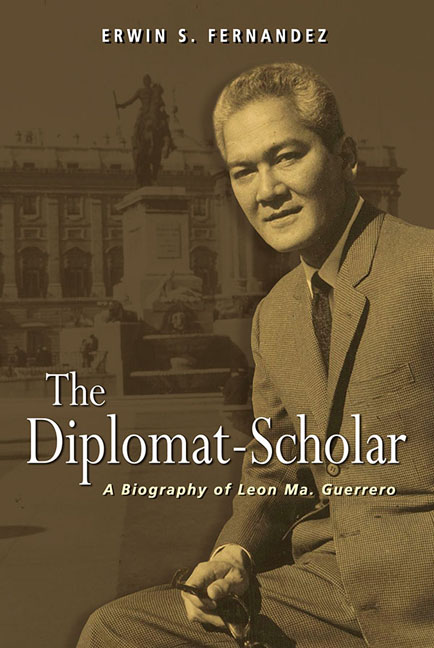Book contents
- Frontmatter
- Dedication
- Contents
- Preface
- Prologue
- Chronology
- I Ermita and Santa Cruz to Intramuros: Between Literary and Legal Career
- II To Tokyo and Back: The Making of a Diplomat
- III Going In, then Out of the Political Jungle: Padre Burgos to Arlegui
- IV London and Madrid: The Philippines in a Resurgent Asia
- V New Delhi to Belgrade: The Philippines towards Non-Alignment
- 18 Homecoming to Asia at Nehruvian India
- 19 “Diplomacy of Development” and Other Speeches
- 20 The Foreign Policy Rescuer and Again, Critic
- 21 The Diplomat as Efficient Intellectual-Bureaucrat
- 22 Endorsing Non-alignment amid Personal Crisis
- 23 Flirting with Dictators
- 24 Martial Law Propagandist
- 25 At Tito's Pre-Balkanized Yugoslavia
- Epilogue
- Glossary
- List of Abbreviations
- Bibliography
- Index
- About the Author
20 - The Foreign Policy Rescuer and Again, Critic
from V - New Delhi to Belgrade: The Philippines towards Non-Alignment
Published online by Cambridge University Press: 12 January 2018
- Frontmatter
- Dedication
- Contents
- Preface
- Prologue
- Chronology
- I Ermita and Santa Cruz to Intramuros: Between Literary and Legal Career
- II To Tokyo and Back: The Making of a Diplomat
- III Going In, then Out of the Political Jungle: Padre Burgos to Arlegui
- IV London and Madrid: The Philippines in a Resurgent Asia
- V New Delhi to Belgrade: The Philippines towards Non-Alignment
- 18 Homecoming to Asia at Nehruvian India
- 19 “Diplomacy of Development” and Other Speeches
- 20 The Foreign Policy Rescuer and Again, Critic
- 21 The Diplomat as Efficient Intellectual-Bureaucrat
- 22 Endorsing Non-alignment amid Personal Crisis
- 23 Flirting with Dictators
- 24 Martial Law Propagandist
- 25 At Tito's Pre-Balkanized Yugoslavia
- Epilogue
- Glossary
- List of Abbreviations
- Bibliography
- Index
- About the Author
Summary
As in London and Madrid, in between his work as ambassador, Guerrero was able to finish the research on Philippine church history he started while he was still in Madrid, where he had sought the help of Spanish priests. De la Costa, who was now the Provincial Superior of the Philippine Province of the Society of Jesus, invited him to write the article to be included in a compilation of discursive essays — a belated contribution to the fourth centenary of Christianity in the Philippines. It dealt with the contrasting religious lives of two Spanish priests after the outbreak of the revolution.
At about this time, Guerrero contemplated editing and publishing a monthly for the first time, aimed for distribution in India and other diplomatic posts. After a talk with his colleagues, his poet-friend Abou-Riche suggested the title Philippine Approaches subtitled A Monthly Review of Writing in the Philippines (Fiction Essays, Poetry, Politics, History, Economics). It was to make its debut in January 1968. Due to limited funds, the magazine was published bi-monthly. Perhaps it was the first of its kind in the entire Philippine diplomatic establishment that it received a special citation from the Manila Rotary Club during its Second Annual Journalism Awards, citing its role in promoting the works of Filipino writers and artists to people in foreign lands.
ASIAN BLOC, UNCTAD AND ISO
In January 1968, Guerrero received a letter from Lopez, now the permanent representative to the United Nations in New York and concurrent ambassador to the United States, who asked him to seek Indian support for his candidature for chairmanship of the First Committee in the United Nations. Guerrero went to the Indian official at the Indian Foreign Ministry with an aide memoire explaining the position of the Philippines on the case. Reacting rather guardedly, the Indian official thought that a decision on the matter could not be reached too early though he understood the necessity of announcing the candidature as early as possible. He was not confident that Lopez would get elected on the basis of the Asian group alone. Having no official instructions from Manila, Guerrero left telling the official to keep in touch with him.
- Type
- Chapter
- Information
- The Diplomat-ScholarA Biography of Leon Ma. Guerrero, pp. 241 - 251Publisher: ISEAS–Yusof Ishak InstitutePrint publication year: 2017

